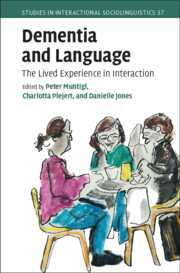Book contents
- Dementia and Language
- Studies in Interactional Sociolinguistics
- Dementia and Language
- Copyright page
- Contents
- Figures
- Tables
- Contributors
- Transcript notation key
- Part 1 Introduction
- Part 2 Dementia and Diagnostics
- Part 3 Dementia and Conversational Strategies
- Part 4 Dementia and Epistemics
- Part 5 Communicative Challenges in Everyday Social Life
- 12 Language and Cognition in Conversations with a Person with Alzheimer’s Disease
- 13 Using Digital Communication Support in Interaction Involving People with Dementia
- 14 “It’s More than Eating, It’s a Social Situation”
- 15 Social Quizzes for People Living with Dementia
- Index
- References
12 - Language and Cognition in Conversations with a Person with Alzheimer’s Disease
from Part 5 - Communicative Challenges in Everyday Social Life
Published online by Cambridge University Press: 21 November 2024
- Dementia and Language
- Studies in Interactional Sociolinguistics
- Dementia and Language
- Copyright page
- Contents
- Figures
- Tables
- Contributors
- Transcript notation key
- Part 1 Introduction
- Part 2 Dementia and Diagnostics
- Part 3 Dementia and Conversational Strategies
- Part 4 Dementia and Epistemics
- Part 5 Communicative Challenges in Everyday Social Life
- 12 Language and Cognition in Conversations with a Person with Alzheimer’s Disease
- 13 Using Digital Communication Support in Interaction Involving People with Dementia
- 14 “It’s More than Eating, It’s a Social Situation”
- 15 Social Quizzes for People Living with Dementia
- Index
- References
Summary
Chapter 12 explores the relationship between cognition and interaction. The longitudinal study, spanning over two years, utilises Conversation Analysis (CA) to investigate the cognitive and interactional abilities of a person with Alzheimer’s disease, ‘May’, through 70 audio recordings of telephone conversations with family members. The chapter acknowledges a close relationship between language and cognition by examining how memory and memory loss are displayed in verbal conduct over time. Furthermore, the chapter sets out to challenge the deficit-focused perspective pervasive in dementia literature, showcasing how May employs sophisticated communicative strategies and transacts routinised practices of interaction even with more advancing dementia. The findings suggest a nuanced understanding of cognitive abilities in dementia, questioning the binary framework of competence versus incompetence in analysing complex cognitive issues and interactional events. The findings contribute to understanding the complexities of Alzheimer’s disease, emphasising the need for tailored communication strategies to enhance the quality of interactions for individuals and their family’s facing dementia. The chapter underscores the significance of using interaction as a window to cognition, offering insights into the degenerative consequences of Alzheimer’s and paving the way for a more nuanced understanding of cognitive decline in the context of family communication.
Keywords
- Type
- Chapter
- Information
- Dementia and LanguageThe Lived Experience in Interaction, pp. 269 - 291Publisher: Cambridge University PressPrint publication year: 2024

